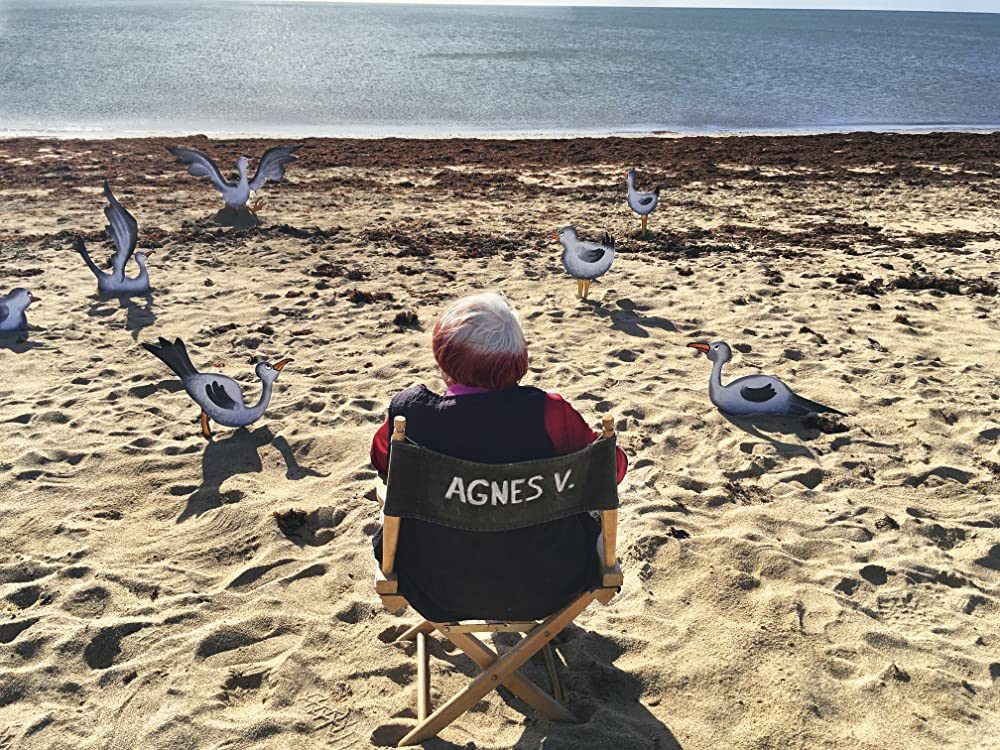By Katya Spiers, Film & TV Digital Editor
Two years ago today saw the passing of a documentary film icon, the founder of the French New Wave and the bearer of the illustrious aubergine and white striped hair. But despite her intimidating accolades, the cinema of Agnès Varda remains one of accessibility and relatability, favouring moments of everyday joy over film-bro impenetrability.
Nevertheless, getting acquainted with the back-catalogue of a director whose career spans over 60 years is no small feat. With Mubi’s Voilà Varda special in place and a three-week Easter vacation ahead of us, now is as good a time as ever to dive into the world of this prolific director.
Ready to jump in? Here’s where to start.
The Vanishing Lion (2003)
A new discovery for me thanks to Mubi, The Vanishing Lion perfectly encapsulates Varda’s enchanting touch in only ten minutes, making it an ideal introduction to her work — even if you’re in a rush. The short is set in the Place Denfert-Rocherau in the South of Paris, home to a large bronze lion statue, the Paris Catacombs and Varda’s home. Like Daguerréotypes (we’ll get to it), the film radiates the director’s intimate connection to the city. Silly and charming, it’s a film that bears no complexities; just chance encounters, the Parisian Springtime and delightful cameos from Varda and her cat Zgouzgou.
Murs Murs (1981)
Filmed over the course of two years that Varda spent in Los Angeles at the beginning of the 1980s, Murs Murs is an anthropological portrait of LA murals and the people behind them, many of whom are immigrants and are — like Varda — struggling to find their feet in the US. In a world that’s constantly developing, Murs Murs offers an intimate look into the lives of no-longer extant communities, through the lens of artworks that have since been covered up or knocked down. It’s a colourful and light-hearted caress of a film that’s as informative as it is watchable.
Daguerréotypes (1975)
Without wanting to sound like your dad after approximately one beer, the world we live in today really is so vastly different to the times that came before. Varda’s portrait of her Parisian street (the Rue Daguerre) in the mid-60s is as close to a time capsule as you can get. Observing the shopkeepers and clients that make up the community — from quirky perfumer to the boulangère whose crusty golden baguettes sustain the whole street — Varda explores the lives, roots and ambitions of the people around her. With fabulous chic turtlenecks a-plenty and kaleidoscopic 60s patterns pasted everywhere, Daguerréotypes plunges you into a world that’s long gone, inviting you to get to know the people around you and share in intimate connections.
The Gleaners and I (2000)
Taking its name and subject from Jean-François Millet’s painting, The Gleaners and I uncovers the stories of the people left behind by industrial farming developments. Intertwining documentary and personal essay film, Varda breathes life into this self-sustaining rural community. From heart-shaped potatoes to dusty antiques, each shot that composes The Gleaners is beautiful and considered. This was the film that made me fall in love with Varda and her curious eclecticism.
Faces Places (2017)
Varda’s final film Faces Places, released less than a year before her death, is a love letter to her expansive and influential career. As her eyesight is fading, Varda and photographer JR take a grand tour of significant places in the director’s life, paying homage to the people she met along the way. From Sète, the small fishing town where Varda grew up and the location of her first film, La Pointe Courte (1955), to Jean-Luc Godard’s country home, Faces Places is an exploration of memory — both individual and collective — and a touching portrait of shared curiosities, comforts and joie de vivre. It’s a joyful illustration of how Varda’s prolific career has had the ability to touch lives and bridge generations.
Agnès Varda’s Speech at the 2017 Governors Awards
Though it’s not a film, this list would not be complete without mentioning Varda’s speech at the reception of her 2017 honorary Oscar. If you’re just getting to know Varda, or already familiar with some of her films, this short video encapsulates the lovable curiosity and openness that characterises all of her films.
Though she was prematurely dubbed ‘the grandmother of the French New Wave’ at the age of 30, it’s a title she certainly grew into — her ability to charm the audience with a perfect combination of silliness and poignancy is, and will forever be, unrivalled.
Featured: IMDb
Are you a fan of Agnès Varda?








